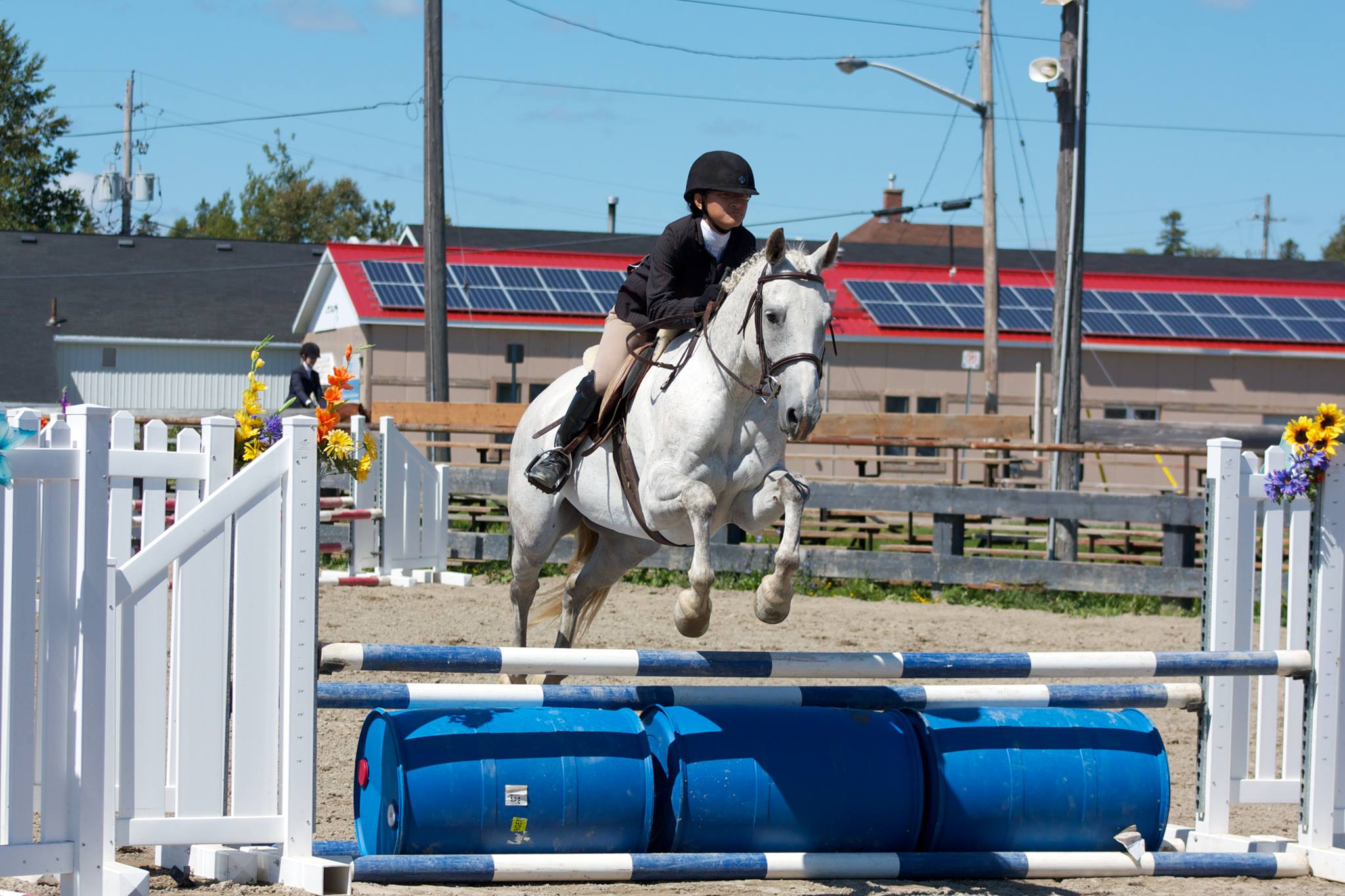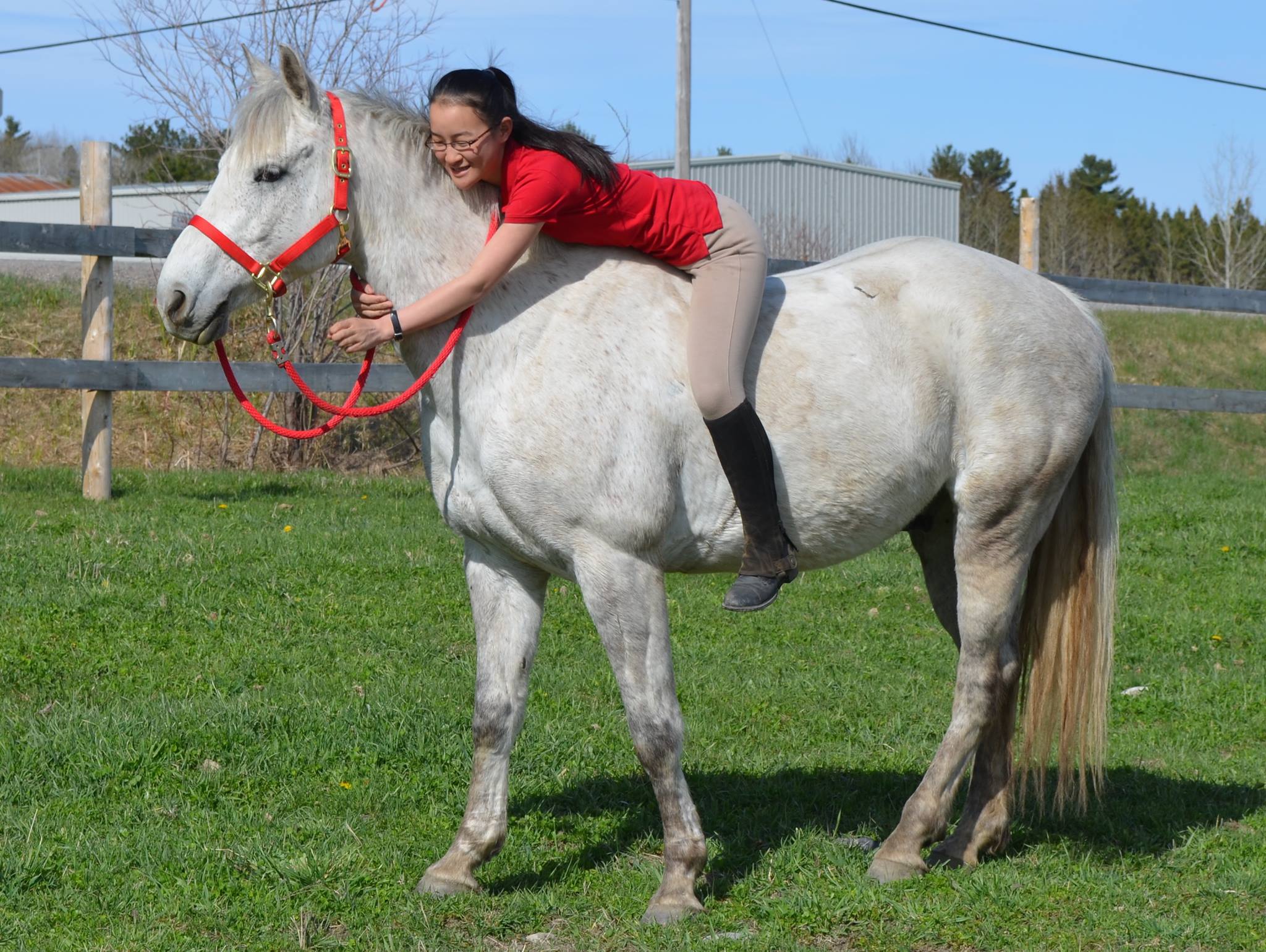When I met Durango, a gray quarter horse, he was still learning. The first day we met, I entered his stall to groom him, but when I was done, he stood blocking the entrance of the door, and I couldn’t get out. I told him aloud to move. He didn’t. I insisted, and pushed his shoulder in an attempt to make him move. Nothing. No matter what I did, he would not bulge, and in the end my coach had to come over and use physical strength to get me out of the stall.
Needless to say, Durango didn’t leave a good impression on me at first. At the time, I didn’t know how to be assertive. I was small in size, not very strong, and lacked self-confidence. I felt like Durango sensed this. It seemed to me like he knew he could push me around and I wouldn’t know how to deal with it.
This is where our journey started.
When I started riding Durango, I was still a beginner rider myself. I was used to riding well-trained ponies with tons of years of schooling behind them, so riding a horse who had as much experience as me was completely new. It was a challenge, and a scary one. I was used to jumping over obstacles, but Durango hadn’t even learned how to jump yet. Perhaps that’s the reason I liked him in the first place: we were both beginners, we both had a lot to learn, and we were both stubborn as hell. Durango, unlike the other horses I’d ridden before, had flaws and a character. He sometimes gave me that “look” I came to recognize so well — it’s as if he was challenging me and whatever command I’d shouted at him.
I have fond memories of our first few months together. Durango stepped on my toes a lot. He would shake his head when I tried to put on his bridle, and he would canter around the arena without acknowledging my rein cues. He would, at times, randomly bolt, and I would find myself going around the arena shouting, “Whoa, whoa, whoa.” Sometimes it worked. More often than not, it didn’t, so I had to jerk on my left rein and run him toward a fence for him to stop.
Not too long after that, I started resenting him. I was jealous of my friends whom I believed had better, well-behaved horses. Durango challenged every demand I made. Riding him, I often felt scared, small, and not very safe. I was sure that one day I would fall off and break my leg.
What’s interesting about horses is that they can smell and feel fear. Looking back, I now understand that Durango and I didn’t get along at first because I wasn’t confident enough. I was the rider, and I had the task to guide him. And yet I couldn’t be assertive, couldn’t give clear commands, and probably left him confused. So Durango did as he pleased.
I remember once we went on a trail ride and found ourselves in a big field. I tensed up immediately. I was overwhelmed with anxiety and with the fear that something would go wrong. I looked around, sensing threats, when in reality I was just scared of finding myself in a big, open space. As a result, Durango tensed up himself, and needless to say, the rest of the ride wasn’t very enjoyable.
Slowly, Durango and I began to learn from each other. We were equals and clueless on certain activities, but we nevertheless made some progress. I will never forget what it was like to get over that first jump. Even today, one of my proudest achievement remains having taught a 1,200-pound animal how to get over a jump.

But it seemed like every step we took forward was followed by two steps backwards. I felt discouraged and wanted to give up. Durango raced towards jumps, then dodged them at the last minute, leaving me feeling unbalanced. He ignored my cues and never slowed down when I asked him to. I didn’t know it at the time, but Durango was teaching me how to cultivate resiliency in times of adversity. He was, in other words, teaching me not to give up.
Durango took no bullshit from me. At times, I screamed, cried, and threw things at him. But Durango would not listen to me until I asked him clearly what I needed and wanted from him. Temper tantrums, stamping my foot and crying led to nothing. Feeling confident, giving a specific command loudly and clearly, is what worked in the end.
Today, I believe Durango wanted me to stop being afraid. I believe he wanted me to have a sense of personal agency and he wanted me to feel empowered. Horses mirror your emotions and force you to observe and be mindful of your own body language, and for that reason I believe that Durango only started respecting me when I started to respect myself.
I can’t help but think that Durango helped me manage outside relationships as well as taught me interpersonal skills. To ensure my own safety, I had to set strong boundaries with this 1,200-pound animal. I had to stop allowing him to push me around, and I had to speak up, find my voice. In a way, I believe that Durango didn’t take my commands seriously until he knew that I meant business. Only then was he willing to listen.
Over the next few years, as Durango and I climbed training ladders, I felt more and more empowered while riding but also on the ground. Because I was responsible to take care of him, I had to honor my commitments. I had to be at the barn at a certain hour and I needed to give him exercise whether I felt like it or not. Taking care of another being gave me a sense of purpose, and also forced me to take care of my own needs. Like the saying goes, “You can’t pour from an empty bucket.” In a way, Durango taught me the importance of self-care.
And that’s the reason I quit riding a few months later, when I found myself in the midst of my first major depressive anymore. I simply couldn’t do it anymore. I couldn’t function and certainly couldn’t take care of myself, much less another living being. For that reason, I decided to take a few months off, and I trusted that Durango would be well-taken care of by those around me. Taking a break from riding Durango wasn’t easy. I was jealous, angry, and worried that other riders would make more progress with him in a few weeks than I had in a year. I was protective of Durango, and I didn’t want anyone else taking care of him. But I had no choice.
I know horses can’t speak to us, but I’d like to think Durango understood. I’d like to believe he knew what I was going through. And I’d like to think he missed me just as much as I missed him.
When I reunited with him, my heart burst with happiness. Durango helped relieve my depressive symptoms. Getting back into riding meant working on my fitness as well as physical symptoms (backache, cramped muscles, fatigue, etc.). As a result of horseback riding, my balance improved, my level of focus and concentration came back, and my muscles strengthened. Mucking stalls, setting obstacle courses, and carrying bales of hay also helped me get back into shape.
During those long summer months, I would sit beside Durango in the field while he grazed and tell him my problems. I treated him like my therapist. I poured my heart out to him and felt as if he listened to me.
More than once, Durango lifted his head and looked at me, sometimes even giving me a nudge, as if to say, “Hey, I’m here and I’m with you.” I gave him long hugs and rode him bareback in the field. The latter was a liberating, freeing and authentic experience of feeling connected to another being.
Fact: You can tell horses your secrets and they won’t judge or discriminate.
Durango was my best friend, my companion. He was there for me when none of the people around me could understand what I was going through. He helped me navigate those first few years of high school and my first mood episode. He was my rock, and with him I could cultivate my inner child.
I have fond memories of our many adventures; swimming in a lake, bathing him on hot summer days; setting up a tent in the field and sleeping near the horses; getting over a 3’6 fence for the first time; spending my allowance on brand new tack and blankets; and so on.
Durango and I had two wonderful show seasons together. I remember one time, I fell off and bit the dust in front of everybody. Lying on the ground, I was embarrassed, and all I wanted was to give up. But I didn’t, I couldn’t. I got up. And when I did, Durango stood right next to me.
Durango, thank you for being the most loyal friend I’ve ever have. Thank you for being attuned to every little detail, thank you for galloping towards me when I called your name. Thank you for making me feel lighter and happier. Thank you for being patient, responsive, intuitive and trustworthy. Thank you for allowing me to learn what horsemanship really means. Thank you for your friendship, all the life skills, and the unconditional love. I miss you every day.

We want to hear your story. Become a Mighty contributor here.

